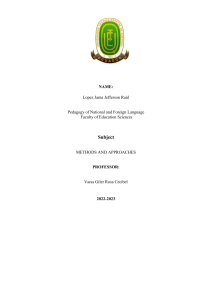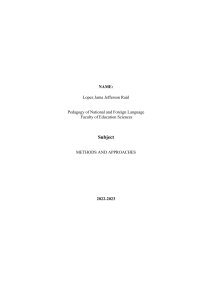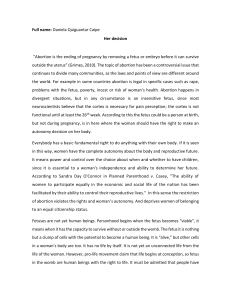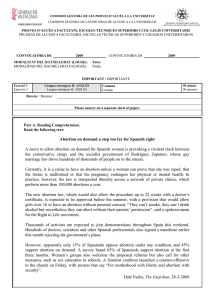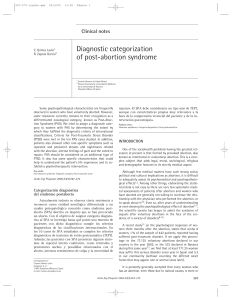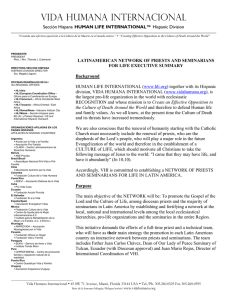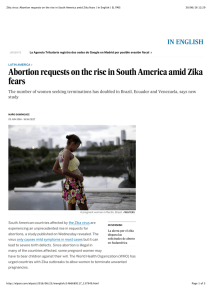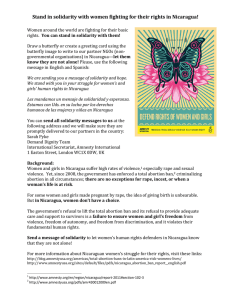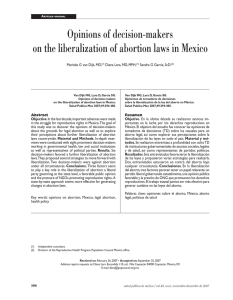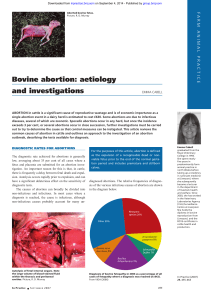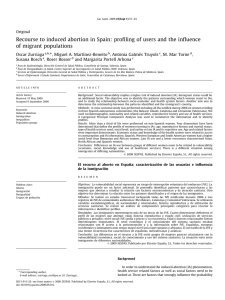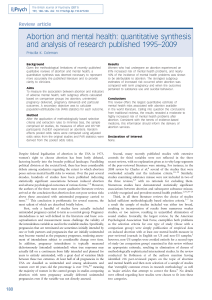Human Life International
Anuncio
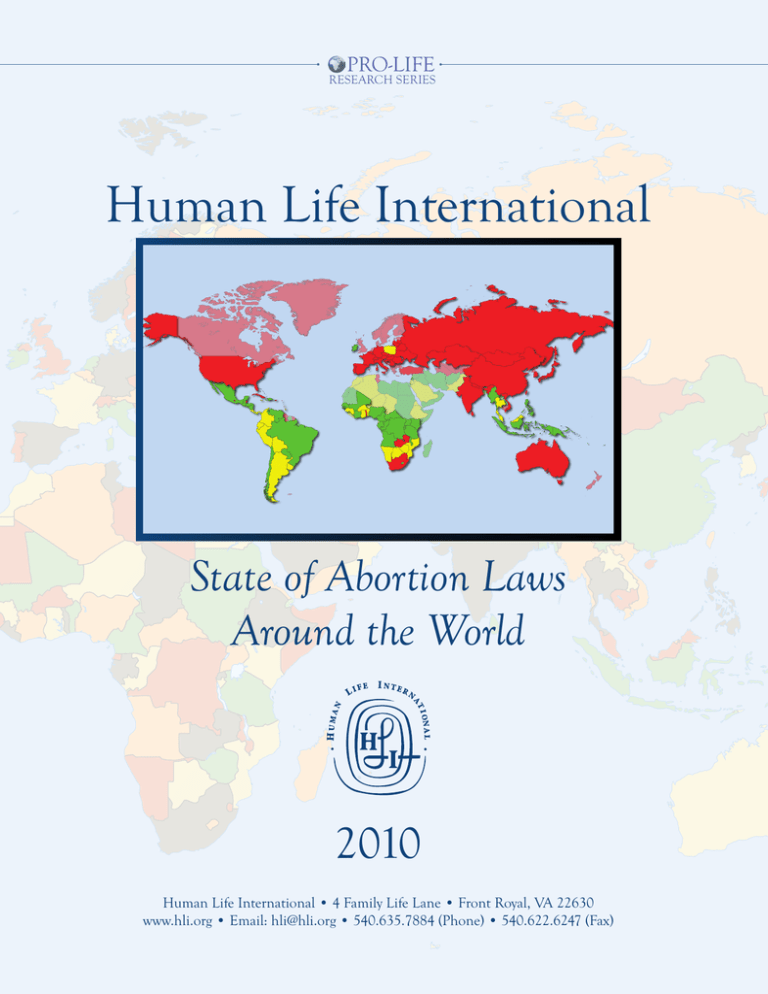
PRO-LIFE RESEARCH SERIES Human Life International U . . . State of Abortion Laws Around the World 2010 Human Life International • 4 Family Life Lane • Front Royal, VA 22630 www.hli.org • Email: [email protected] • 540.635.7884 (Phone) • 540.622.6247 (Fax) State of Abortion Laws Around the World Human Life International’s Pro-Life Research Series (PLRS) is meant to arm the active pro-lifer with accurate and relevant information on life issues around the world. The case for life is easy to establish, at least to those of good will, when the facts are known. In this edition, we present the current state of abortion laws worldwide. There are two main keys that tell the story: First, there is the color-coding of countries, which indicate the existence—or non-existence—of pro-life laws. Second, the countries where Human Life International’s pro-life missionaries are currently active are named and presented in darker colors. It is our hope that by providing this information, all those of good will may wake up to the destruction being wrought by the Western elites’ culture of death and join in the fight for life around the world. We are called to solidarity, especially with the weakest and poorest of our brothers and sisters, and they desperately need our help. To share this information, visit www.hli.org/research, and click on the PLRS link. From here you can download the document as a PDF or contact HLI to order more copies for your parish, school, or other organization. Finally, please pray for the children and families who are threatened by abortion, and for the success of the proAs the maps clearly show, legalized abortion has life missionary efforts of Human Life International and overwhelmed the Northern Hemisphere. In many of others who are fighting for life around the world. these radically secularized countries, small compromises on abortion have led, as they always do, to abortion on Pro-life Laws KEY demand. It is also worth noting that these laws are almost Laws Protecting Life never chosen democratically—but are rather imposed by courts, legislatures, or dictators who have divorced Laws Allowing Exceptions for Abortion themselves from responsibility to their constituents. Abortion On Demand The difference between the Northern and Southern Hemispheres could not be clearer. In still-religious and Country Names KEY mostly developing nations, the culture of death has made slower inroads. But the assault is well underway: Western Country names in regular type face denote elites are now pouring billions of dollars into pro-abortion HLI Affiliates. propaganda and abortion clinics that operate often illegally Country names in parentheses denote and with little supervision.1 Birth rates are falling in the HLI Associates. developing world2, following the troubling demographic trends of the developed world, as population controllers Country names in italics denote countries endeavor to convince the families of Africa, Latin America where HLI works without permanent and other regions that they should “get with the times” and affiliate or associate. stop having children. 1 http://www.timesonline.co.uk/tol/news/world/us_and_americas/article6350303.ece 2 http://www.lifesitenews.com/ldn/2009_docs/DonFederRoseDinnerspeech.pdf Abortion Laws in Africa Mali Senegal U Nigeria Central Guinea African Republic Burkina Faso Cameroon . Ivory Benin Coast Ghana Uganda (Dem. Rep. Togo Kenya Rwanda of the Gabon Burundi . Congo) . Rep. of Congo Tanzania Malawi COUNTRY DEVELOPMENTS Zambia Cameroon— Cardinal Tumi of Douala Zimbabwe Namibia Botswana led a march of over 20,000 persons in July which made a very strong pro-life statement in Cameroon. George Wirnkar of HLI Cameroon was one of the principle organizers of this protest against the ratification of the Maputo Protocol by the government.1 The Protocol, emanating from the African Union, calls for the legalization of abortion. South Africa Swaziland Lesotho Nigeria—Health ministers from the Economic Community of West African States (ECOWAS) called for the passage of “safe abortion” laws at the conclusion of their meeting in October 2009 in Nigeria. Almost all the countries in West Africa do not permit abortion, and this statement by government ministers provoked widespread outrage.2 1 http://spuc-director.blogspot.com/2009/07/good-news-from-cameroon-20000-march-for.html 2 http://english.peopledaily.com.cn/90001/90777/90855/6795648.html Abortion Laws in Europe and Asia Luxembourg—Parliament passed a law legalizing assisted suicide in March, making Luxembourg the third European country to do so. Grand Duke Henri de Luxembourg courageously refused to sign the bill, choosing to risk his throne rather than violate his conscience. The Parliament subsequently modified the Constitution to strip him of the monarch’s traditional prerogative to stop a law by refusing to sign it.1 COUNTRY DEVELOPMENTS Slovakia— In September a law ad- Croatia (2) opted by the National Council of the Latvia Slovak Republic went into effect Lithuania (3) requiring that a woman Belarus Czech Republic (2) seeking an abortion Ireland Germany Poland Slovakia be provided informaUkraine (3) Belgium (France) tion about the risks of Switzerland Romania abortion, be provided Serbia Hungary information on proAustria (Spain) life alternatives, and Rome be required to wait for 48 Malta hours before the procedure can (Lebanon) occur. This law was adopted in part due to the work of Marek Michalcik of the Forum Zivota, HLI’s affiliate in heavily Catholic Slovakia. Spain— Despite a massive pro-life rally which brought out over a million people in Madrid in October, the Spanish Parliament legalized abortion on demand for any reason up to 14 weeks of pregnancy. They also rescinded requirements for parental consent for abortions sought by minor girls.2 Switzerland—Pro-Life groups, including HLI Switzerland, filed a lawsuit to prevent the sanctioning of assisted suicide. The Swiss Government has been embarrassed by so-called “Death Tourism” in which persons come to Switzerland to be euthanized by the Dignitas clinic or other groups. A new law restricting euthanasia is expected in March 2010.3 East Timor—In defiance of great pressure from Western elites, the parliament of East Timor passed a new pe- nal code that maintains the criminalization of abortion in June. East Timor is one of the most Catholic countries in the world with 93% of the population in the Church.4 Philippines—The Catholic Bishops Conference of the Philippines issued its first “Catechism on Family and Life” in December to guide the faithful in voting during the 2010 elections. For several years anti-life “Reproductive Health” bills have been introduced in the Filipino legislature. All have been defeated so far.5 1 http://www.catholicnewsagency.com/news/luxembourg_legalizes_euthanasia_after_putting_limits_on_grand_dukes_power/ 2 http://www.google.com/hostednews/ap/article/ALeqM5gZkwyCkZ-yQOutllW67a02dnLqQAD9CL4ML00 3 http://www.findingdulcinea.com/news/international/2009/Oct/Swiss-Government-May-Restrict-or-Even-Ban-Assisted-Suicide.html 4 http://www.lifesitenews.com/ldn/2009/jun/09061003.html 5 http://monkshobbit.wordpress.com/2010/01/04/cbcps-catechism-on-family-and-life-for-the-2010-elections/ Kazakhs Russia (2) stan Mongolia (Nepal) Japan Hong Kong India (7) South Korea Taiwan Myanmar Vietnam (Thailand) Sri Lanka Philippines (3) Malaysia (Brunei) Australia—In December, the government of the state of Queensland refused to vote to revoke the law which outlaws abortion. Unfortunately, this law is seldom enforced. After a recent controversy over the RU-486 abortion pill, the Queensland legislature did vote to amend the criminal code to state that the abortioncausing drug Mifepristone is legal.7 Papa New Guinea Singapore Indonesia (4) East Timor 6 http://www.lifenews.com/nb237.html 7 http://www.lifenews.com/int1421.html Australia COUNTRY DEVELOPMENTS China South Korea—Alarmed by an incredibly low birth-rate of 1.22 children per family, Kwak Seung-jun of the Presidential Council for Future and Vision announced in November that the South Korean government will begin a crackdown on illegal abortions and work to create a climate where abortion is discouraged.6 Abortion Laws in NOrth America United States HLI Central Headquarters COUNTRY DEVELOPMENTS United States—(Obviously, too many assaults on life occurred in the United States in 2009, so we just mention some of the most important events here) January was a very bad month for the cause of Life in the United States, and indirectly, the rest of the world. The U.S. Senate confirms Obama appointee Hillary Rodham Clinton as Secretary of State, and she promptly promised to promote abortion “rights” globally. The next day, President Obama issued a statement on the anniversary of Roe v. Wade (1973) praising the court’s move. The very next day, an executive order from Obama revokes the Mexico City Policy that formerly withheld U.S. taxpayer dollars from organizations that promote abortion overseas. In March President Obama rescinds former President Bush’s executive order limiting federal funding for stem cell research. From then on, tax dollars go to harvesting stem cells from new human embryos.1 In April, Kathleen Sebelius is confirmed as the Obama administration’s Secretary of Health and Human Services despite, as Governor of Kansas, vetoing late-term abortion bans and taking campaign donations from the late abortionist George Tiller.2 In December, President Obama signed an omnibus spending bill containing almost $700 million for or- HLI Hispanic Division Headquarters (Miami, FL) ganizations that promote and perform abortion abroad, including $55 million for the United Nation Population Fund (UNFPA), which is on record as assisting China’s coercive one-child policy. The same bill created funding for abortions for poor women in the District of Columbia. Canada—Abortion is considered by many to be even more sacrosanct and unchallengable in Canada than in the United States. Yet in a rare pro-life statement at the national level, MP Maurice Vellacott challenged the status quo in November, saying “As a compassionate, caring, progressive society, we should provide the kind of support and options for the expectant mother, so that she doesn’t feel her only choice is to choose death for her offspring.” Since, from the anti-life perspective, the abortion battle has been won, this progressive nation is now looking for ways to legalize euthanasia. In May, Francine Lalonde, a Member of Parliament, introduced a bill to legalize euthanasia in Canada. This latest such bill would add an exception to the criminal code, ensuring that doctors will not face criminal prosecution if they help a person die who is at least 18 years old and who, after being given or refusing treatment, continues to “experience severe physical or mental pain without any prospect of relief,” or suffers from terminal illness. This was the fourth such bill introduced in the last five years, the others having failed to pass. (Source: LifeSiteNews) 1 http://www.lifenews.com/obamaabortionrecord.html and http://www.lifesitenews.com/ldn/2009/may/09050808.html 2 Bloomberg News, April 28, 2009 Abortion Laws in Latin America Brazil—Archbishop José Cardoso Sobrinho (Dominican courageously fought to save a Puerto Rico Republic) Cuba Mexico young girl from having an aborDominica tion and announced that those who facilitated the aborting of her (Belize) (Jamaica) St. Lucia preborn twins were excommunicated. Guatemala (Barbados) Curacao Nicaragua He was attacked in the press, even by (St. Vincent) El Salvador Venezuela (2) a fellow archbishop in Rome. HLI gave Honduras Grenada Costa Rica Archbishop Cardoso the Cardinal von Galen Trinidad & Colombia Panama (2) Award in April in recognition of his pro-life Tobago stand.1 (Ecuador) COUNTRY DEVELOPMENTS The Dominican Republic—Included in this Caribbean nation’s new constitution is an article which declares Peru “the right to life is inviolable from conception until death.” This measure passed in September with an overwhelming majority of 128 Bolivia to 34 among members of the constitutional assembly. The Dominican Paraguay (2) Republic now has some of the strongest pro-life legal protections in the Chile 2 world. Honduras—Despite recent serious political disruptions, Honduras passed a law banning all forms of the “morning-after pill” or “emergency contraception” as it is sometimes called. They relied on scientific evidence that these pills can have an abortifacient effect by preventing the implantation in the uterus of a newly conceived child. The law from April was vetoed by then-President Zelaya, but it was subsequently promulgated as a law in November by Interim President Micheletti.3 Uruguay (2) Argentina Mexico—To date, 17 state governments have amended their state constitutions to protect life from conception to natural death. These pro-life laws came in response to the legalization of abortion in the state government of Mexico City. Many Mexican bishops have strongly spoken out for the Right to Life.4 Peru— The Constitutional Court ruled in October that the “morning-after pill” may not be distributed at public health care facilities because the abortifacient effect of these pills would violate their pro-life laws. Those in favor of the morning-after pill were incapable of proving that they did not kill conceived children by preventing their implantation in the wombs of their mothers.5 Uruguay—In Uruguay’s November election a former Marxist guerilla, José Mujica, won the presidency. He has pledged to legalize abortion, and his ruling coalition may have the votes to do so in 2010. A previous attempt to legalize abortion in Uruguay was prevented by the veto of former president, Tabaré Vazquez.6 1 2 3 4 5 6 http://www.lifesitenews.com/ldn/2009/apr/09041709.html http://www.dominicantoday.com/dr/local/2009/9/18/33282/Pro-life-groups-get-their-way-in-Dominican-Constitution http://www.womenslinkworldwide.org/pdf_press/press_release_20091126_en.pdf http://www.hli.org/index.php/mission-field/latin-america-and-the-caribbean/678?task=view http://www.genethique.org/En/press/press/2009/october/26_30.html http://www.lifenews.com/nb237.html PRO-LIFE The mission of Human Life International is to create effective opposition to the culture of death around the world. HLI’s Pro-life Research Series provides up-to-date information on the status of life issues around the globe in order to equip you with the resources needed to understand and fight this battle for life. Included in this series is “State of Abortion Laws Around the World,” “The Demographic Impacts of Abortion,” “ProAbortion Violence,” and “The Case Against Condoms.” RESEARCH SERIES Pro-Abortion Violence in the United States NOTE: You can find complete documentation on all of the incidents on this map at HLI’s website: www.abortionviolence.com. Continued from page 4. Macalia Blackburn, especially when she was pregnant. He also loved to torture his little 22‑month‑old daughter Marcela. Finally, he tortured the little toddler to death. When she was taken to a hospital after she died, horrified doctors found that she had many broken bones, and that most of her body was covered with bruises, lacerations, and burns. She had obviously suffered the most extreme agony for several weeks before she died. During the course of their 2‑1/2 year relationship, Yellowbear beat up Macalia at least fifty times, “not counting times she was only hit.” Macalia was hospitalized three times for her injuries, each time when she was pregnant. An assistant county attorney described Marcela’s death as “especially atrocious or cruel. ... She was made to suffer during the last weeks of her life. It is undeniable she would have been in great pain and agony.” A jury found Yellowbear guilty of first‑degree murder in the death of his baby daughter, and he was sentenced to life in prison. Human Life International’s Pro-Life Talking Points HLI’s Pro-Life Talking Points series provides pro-life activists with clear and concise information with which to argue against common misinformation they encounter while debating life issues. Feel free to download (www.hli.org), copy, and distribute these one-page (twosided) documents as needed. www.HLI.org HLI Research (available at www.hli.org) is an extensive online resource center for life issues. This easyto-use online version of HLI’s own library is made available to you so that you can tap into our vast collection of pro-life data, analyses, and tools, which are now specially formatted for online use. Visit www.hli.org for a free PDF downloads of HLI’s Pro-Life Research Series or Talking Points. You may also request free hard copies by calling HLI at 800-549-LIFE.
